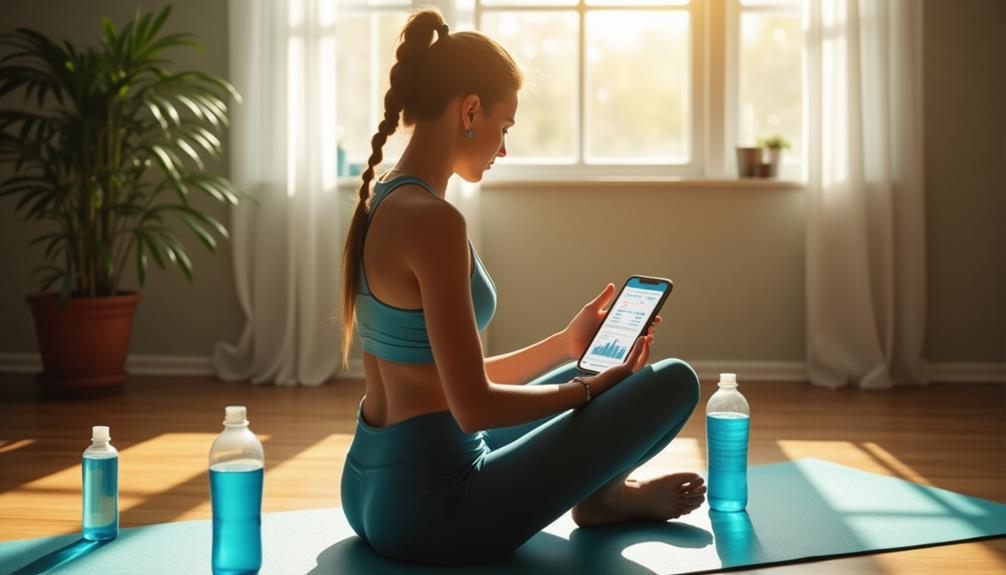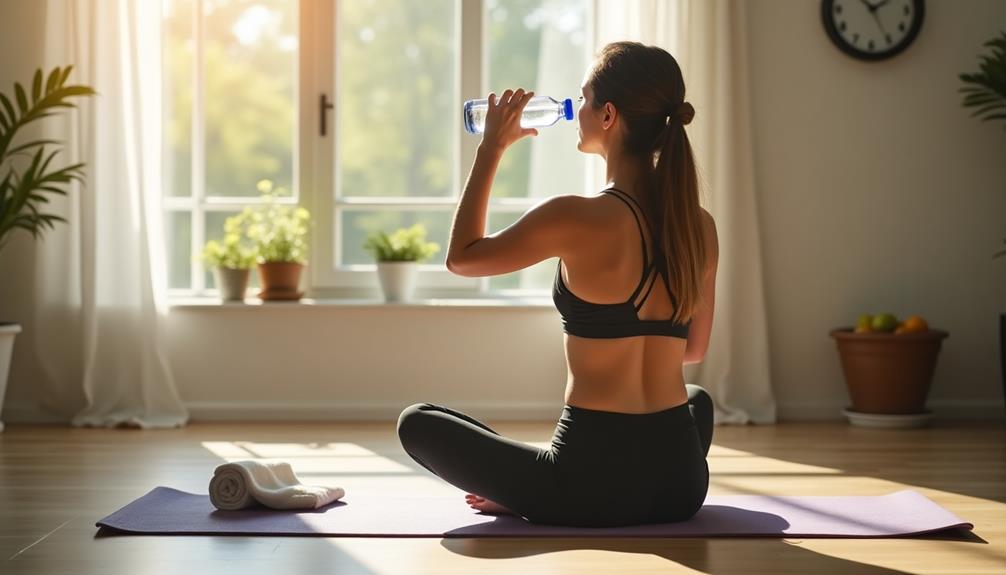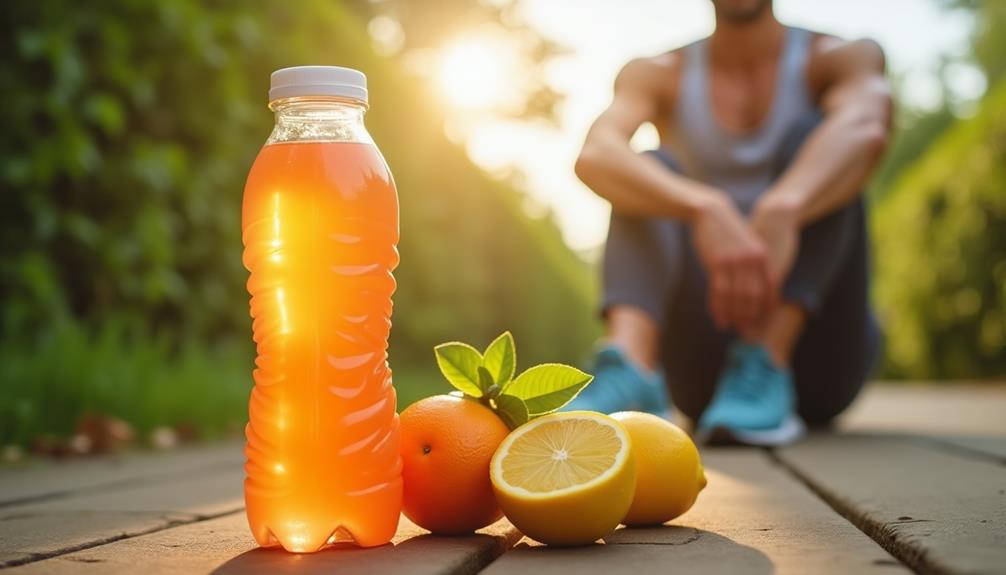Managing fatigue through hydration is essential for post-workout recovery. First, understand your hydration needs; aim for about half your body weight in ounces of water daily. Next, choose the right fluids—water is great, while sports drinks can help replenish lost electrolytes. Timing matters too; drink 16 to 24 ounces within an hour of finishing your workout. Don't forget to incorporate electrolytes like sodium and potassium for best muscle function. Finally, monitor your body's signals—thirst, headaches, or cramps can indicate dehydration. By following these tips, you'll enhance your recovery and energy levels, and there's so much more to explore!
Core Insights
- Rehydrate with 16 to 24 ounces of water within the first hour post-workout to replenish lost fluids effectively.
- Incorporate fast-acting carbohydrates, such as fruit or sports drinks, to restore glycogen levels after exercising.
- Monitor body signals like thirst, headaches, and muscle cramps to identify hydration and electrolyte needs.
- Choose fluids wisely; opt for water or coconut water over sugary drinks for optimal recovery without added calories.
- Maintain consistent hydration throughout the day to support energy levels and reduce fatigue during and after workouts.
Understand Your Hydration Needs

Understanding your hydration needs is essential for managing fatigue effectively. Staying properly hydrated helps maintain energy levels and supports overall wellness. Start by recognizing your personal fluid requirements; these can vary based on activity level, climate, and individual health. Generally, aim for about half your body weight in ounces of water daily.
During workouts, you might need to increase your intake. Pay attention to your body's signals; if you feel thirsty, it's a clear sign you need to drink. Electrolyte gummies can be an excellent option for replenishing essential minerals lost through sweat, especially for athletes and active individuals. Additionally, consider monitoring the color of your urine; pale yellow indicates good hydration, while dark yellow suggests you need more fluids. By prioritizing hydration, you'll be better equipped to combat fatigue and enhance your performance.
Choose the Right Fluids

After recognizing your hydration needs, it's time to focus on what you're actually drinking. Choosing the right fluids is essential for your recovery. Water is always a great option, as it replenishes lost fluids without added sugars or calories. If your workout was intense or prolonged, consider sports drinks. These provide electrolytes and carbohydrates, helping to restore energy levels. Coconut water is another natural alternative, offering hydration and essential nutrients. For best hydration, look for coconut water brands that are high in potassium and free from added sugars or preservatives. When selecting coconut water, consider factors such as taste, nutritional content, and packaging sustainability. Avoid sugary sodas and excessive caffeine; they can dehydrate you. Herbal teas can also be a soothing choice post-workout, aiding relaxation. Remember, the goal is to replenish what you've lost while promoting recovery, so opt for fluids that support your body's needs effectively.
Time Your Hydration

After your workout, rehydrate promptly. Aim to drink at least 16 to 24 ounces of water within the first hour. This action aids recovery and replenishes lost fluids. Consider incorporating fast-acting carbohydrates into your post-workout hydration routine to replenish glycogen stores and support peak recovery. Remember, consistent hydration throughout the day also supports your overall energy levels. By timing your hydration wisely, you'll enhance your recovery and minimize fatigue.
Incorporate Electrolytes

Think about including:
- Sodium: Helps maintain fluid balance and prevents muscle cramps.
- Potassium: Essential for muscle contractions and nerve function.
- Magnesium: Aids in muscle recovery and reduces fatigue.
Monitor Your Body's Signals

Listening to your body's signals is vital for managing fatigue effectively. Pay attention to how you feel after a workout. Are you thirsty? That's your body's way of signaling dehydration. If you notice headaches or dizziness, it's crucial to hydrate immediately. Also, watch for muscle cramps, which can indicate an electrolyte imbalance.
You should track your energy levels throughout the day. If you're feeling unusually tired, it might be time to rest and rehydrate. Remember, everyone's body is different. What works for someone else might not work for you. By tuning in to your personal signals, you can better prepare for your next workout and enhance your recovery process. Prioritize these cues to keep fatigue at bay.
Frequently Asked Questions
How Much Water Should I Drink Daily, Even Without Exercise?
You should aim for about 8 cups of water daily, but your needs can vary. Listen to your body, and adjust your intake based on factors like climate, activity level, and personal health.
Can Caffeine Impact My Hydration Levels During Workouts?
Did you know that caffeine can cause a slight increase in urine output? While it can boost your performance, it might lead to dehydration if you're not drinking enough water during your workouts. Stay mindful!
What Are the Signs of Dehydration Beyond Thirst?
Dehydration goes beyond just feeling thirsty. You might notice dry mouth, fatigue, dizziness, dark urine, or headaches. When you experience these signs, it's important to rehydrate to maintain your body's best performance and health.
Is It Possible to Overhydrate After Intense Workouts?
Imagine a river overflowing its banks, drowning the surrounding land. Yes, you can overhydrate after intense workouts. Your body needs balance, so listen to its signals; too much water can lead to serious complications.
How Does Climate Affect My Hydration Needs During Exercise?
Climate greatly affects your hydration needs during exercise. In hotter conditions, you sweat more, losing fluids faster. You'll need to drink more to stay hydrated, while cooler weather may require less fluid intake. Adjust accordingly!

